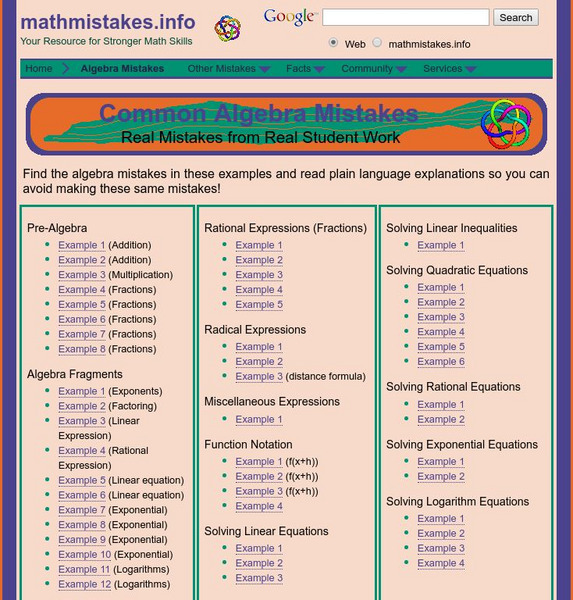Illustrative Mathematics
Illustrative Mathematics: A Apr Zeroes and Factorization of Quadratic Polynomial
This is the first of a series of problems building to an understanding of an important property of polynomial functions, that a polynomial of degree d can have at most d roots. Aligns with A-APR.B.2.
Purple Math
Purplemath: Completing the Square: Solving Quadratic Equations
Purplemath gives several examples which clearly show the process of completing the square to find the maximum and minimum solutions to a quadratic equation.
Texas Instruments
Texas Instruments: Explore Graphs and Factors
Students use a graphing calculator to explore the relationship between the linear factors of a quadratic function and its zeros. They learn that the x-intercepts and axis of symmetry of a quadratic function can be determined from its...
PBS
Pbs: String Product: Y = X^2
Examine how a giant sculpture at the National Museum of Mathematics represents the solutions to the equation y=x^2. This video focuses on the basics of graphing quadratic functions and the relationship between x and y values along the...
Math Planet
Math Planet: Algebra 2: Standard Deviation and Normal Distribution
Gain an understanding of standard deviation and normal distribution by viewing an example and a video lesson.
Other
Math Mistakes: Common Algebra Mistakes
Learn from other student's mistakes by reviewing examples of the following Algebra topics: rational expressions, radical expressions, function notation, solving linear equations, solving linear inequalities, solving quadratic equations,...
Khan Academy
Khan: Lsn 8: Interpreting Relationships in Scatterplots/graphs/tables/equations
This lesson focuses on Interpreting and analyzing linear, quadratic, and exponential models and graphs. Students will use best fit lines to interpret contexts, distinguish whether contexts are linear or exponential functions, use the...
Illustrative Mathematics
Illustrative Mathematics: F Le Choosing an Appropriate Growth Model
The goal of this task is to examine some population data for large cities from a modeling perspective. Learners are asked to decide if the population data can be accurately modeled by a linear, quadratic, and/or exponential function, and...







